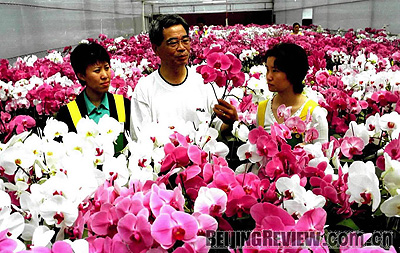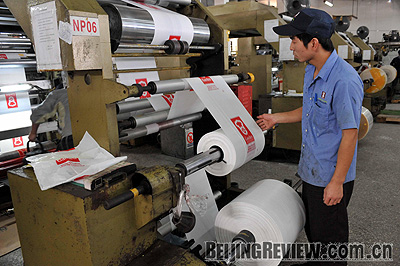| Southeast China's renowned Dongguan City in Guangdong Province, an industrial center that claims to be the "shoe factory for the world," has begun to see the grim reality of the global financial crisis. Orders have dropped sharply, capital recovery has become difficult, raw materials and labor costs have risen, and factories have been forced to close down in a city whose economy depends so much on exports.
Since the late 1980s, the city has been home to many shoe factories started by Taiwanese entrepreneurs. These factories gradually developed into OEM (Original Equipment Manufacture) for international brands like Nike and Adidas. As a result, the city grew full with Taiwanese investment firms.
 |
|
HOT HOUSE: Staff tend to flowers at a Taiwanese-owned greenhouse in Xiamen, Fujian Province (ZHANG SHENGGUI) |
 |
|
BUSINESS ACROSS STRAITS: A worker busy on a production line at a plastic products factory owned by Taiwanese entrepreneurs in Dongguan City, Guangdong Province (ZHUANG JIN) |
But now times have become hard for these firms, and Dongguan is not the only city where the worldwide crisis is threatening to shutter Taiwanese enterprises. The Association of Taiwan Investment Enterprises on the Mainland (ATIEM) released a survey of 1,500 Taiwan-funded companies and the results showed that half of them are suffering so greatly that they had to scale back their normal operations.
"We feel their pain," said Li Yafei, an official with the Taiwan Affairs Office of the State Council who is also secretary general of the Association for Relations Across the Taiwan Straits. The country is working at a series of policies to support Taiwan-funded enterprises, Li said.
"It was way beyond our expectations that the crisis would have such a profound impact on these entities," said Zhang Hanwen, President of ATIEM.
Zhang used to be called "Daddy Zhang" because he was one of the earliest pioneers to venture to the Chinese mainland. In 1991, he invested in his first project starting a shoe workshop that had only one production line. "After one year of operation, the business was good and I decided to expand the production," he said.
Now he owns several companies that make shoes, rubber and printing. Though he is getting near his retirement age, Zhang will not leave until he proves that Taiwan-funded enterprises can make it through the hard times.
"It is not the same economic situation as when I first arrived on the mainland," Zhang said. "In my time, transportation in Dongguan was completely backward and there was not even any taxi service."
It is the continuous improvement of the economic environment that has lured increasing numbers of Taiwanese investors to the mainland, he said. In his opinion, the mainland has labor and resource advantages to which Taiwanese investors bring capital, technology and clients. Those Taiwanese investors are closely tied to China's progress of reform and opening up, he said, being its witnesses, participants and beneficiaries. "Such cooperative and complementary economic patterns benefit both sides of the Taiwan Straits," Zhang said.
Though the export market for textiles and clothes is still on its way to recovery, many Taiwanese businessmen have demonstrated their faith as they have rented new booths in a commodity market in Shaoxing, Zhejiang Province, which is Asia's largest light textile city.
"Taiwanese entrepreneurs need to huddle together to maintain warmth. China's central and local governments have provided many preferential policies, as well. Their kindness and sincerity have also boosted our faith," said Zhang.
Financing problem
"The breaking of the funding chain is a more horrible thing than the decline of orders," said Li Zhanhao, head of a Taiwanese investors association in Jiaxing, Zhejiang Province. An enterprise can hold on for a while if the orders go down, but if the fund chain breaks, it would come to a quick death, Li said.
As many Taiwanese enterprises are small in scale, they have a hard time getting mortgages on assets and land, and they have insufficient credit when they try to raise funds. "In the risk assessment, the bank can't build trust in the enterprises by one or two inspections, thus the mortgages on land are unavoidable," said Wei Guoxiong, Chief Risk Officer at the Industrial and Commercial Bank of China.
During 2008's Fourth Cross-straits Economy, Trade and Culture Forum, three large institutions-China Development Bank, Industrial and Commercial Bank of China, and Bank of China-decided to provide Taiwan-funded enterprises with financial support totaling 130 billion yuan ($18.8 billion) over three years. The Bank of Shanghai's Nanjing branch also inked agreements with the city to offer a 3-billion-yuan ($434 million) loan to Taiwan-funded enterprises over two years.
"The key to solving the financing difficulty for the Taiwanese enterprises is guaranteed mortgages," said Wang Yi, head of the Taiwan Affairs Office of the State Council. Ten new policies were revealed at the Fourth Cross-straits Economy, Trade and Culture Forum, the first of its kind that supported the finances, taxation and credit for small and medium-sized enterprises, including those from Taiwan.
Upgrades
At the end of 2008, a consulting group consisting of professionals from both sides was formed in Dongguan to provide services on policies, industry information, technology, patent rights transfer and talent training. It is also a concrete measure of the 10 new supportive policies.
"The enterprises carry many problems with them, that's also one big reason why they are affected by the global financial crisis," said Zhang, who is also vice president of the consulting group. Though some of the Taiwan-funded enterprises have made big money, they are still at the lower end of the industry chain, with a few disadvantages such as weak innovation power, low-level management and lack of knowledge of the national policies.
In fact, the Taiwanese businessmen's association has already formed a committee to boost the upgrade and transformation of the small and medium-sized Taiwan-funded enterprises. The local government has put up platforms to help them fulfill the mission.
"We are so aware of their situation and we have been appealing for a more open and tolerant policy. But the emphasis must be put on the industry upgrade and transformation, that's the fundamental way for these enterprises to survive," said Chen Xihui, an official with the city's Taiwan affairs bureau. He said in the long run these Taiwanese enterprises have to expand their research capacity, raise the added values of their products and aim at not just the foreign but also the domestic market.
In 1995, a Taiwanese cyclist seized the opportunity of the mainland's economic opening up, gave up his sports career and established a company to sell Giant bicycles. Now his bicycles have been sold to 70 countries and regions all over the world. The company had set up a production base in Shanghai and another being built in Tianjin is said to be the world's largest bicycle factory.
"The mainland market is expanding, like in real estate, construction, finance and the service sector," said Zhang, who added that Taiwanese entrepreneurs will not be confined to the processing and trade businesses, because they have the ability to be involved in other fields and foreign projects.
The ATIEM is headquartered in Beijing. "The association notifies its members in time when there are business opportunities," said Zhang, the association's president.
The association is also helping build a more stable and relaxing environment for the Taiwanese businessmen to live and work. Schools have been set up to give education to their children who were once left at home on the other side of the Straits.
| 